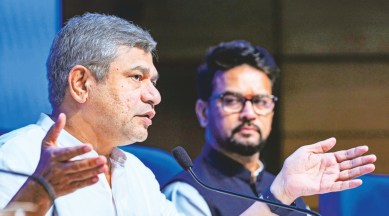Stay updated with the latest - Click here to follow us on Instagram
In green mobility push, Cabinet nod for 10,000 electric buses in 100 cities
According to Union Minister Anurag Thakur, of the Rs 57,613 crore allocated to the scheme in PPP (public-private partnership) mode, Rs 20,000 crore will be provided by the Centre while the rest will be borne by the states.

In a move to promote green mobility across, the Union Cabinet on Wednesday approved the PM-eBus Sewa scheme for operation of 10,000 electric buses in 100 cities, with priority to those without an organised bus service.
According to Union Minister Anurag Thakur, of the Rs 57,613 crore allocated to the scheme in PPP (public-private partnership) mode, Rs 20,000 crore will be provided by the Centre while the rest will be borne by the states.
He said the scheme will support bus operations in the form of a “per kilometre aid” for 10 years and the Centre will also provide support for creating power infrastructure for the buses. In the Union Territories, hill states and the Northeast, 90% of the funding cost will be borne by the Centre, he said.
The scheme will create around 45,000 jobs, Thakur said.
In a statement later, the Government said the scheme will “promote e-mobility and provide full support for behind-the-meter power infrastructure”.
“The support to bus priority infrastructure shall not only accelerate the proliferation of state-of-the-art, energy efficient electric buses, but also foster the innovation in the e-mobility sector as well as development of a resilient supply chain for electric vehicles. This scheme shall also bring in economies of scale for procurement of electric buses through aggregation for e-buses,” it said.
According to Thakur, the scheme will be rolled out in 100 cities selected out of 169 cities with a population between 3 lakh and 40 lakh. The cities will be selected through a “challenge method”, he said.
Thakur said cities with less than 5 lakh population would get 50 buses each, while those with a population of 5 lakh to 20 lakh would get 100 buses, and those with 20 lakh to 40 lakh population would get 150 buses.
“The states and cities that scrap old buses will be given additional e-buses. The procurement, maintenance and operation of these buses will be done in a PPP mode and through competitive bidding,” he said.
The second part of the scheme — the Green Urban Mobility Initiatives — will strengthen multi-modal interchange facilities, the National Common Mobility Card project and the charging infrastructure in cities, the government statement said.
For this, Thakur said, cities will be selected through a “Green Mobility Challenge”.